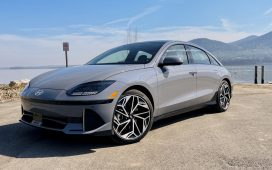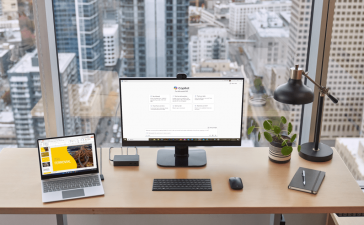Trek announced two new electric cargo bikes — Fetch Plus 2 and Fetch Plus 4 — aimed squarely at the growing number of families who are looking to replace a car with a more sustainable mode of transportation.
The two models are pretty distinct from each other. The Fetch Plus 2 is a long-tail cargo bike with an extended rear rack for carrying children, cargo, or a mix of both. And the Fetch Plus 4 is a box bike, also known as a bakfiets, with a long wheelbase and a generous front cargo area. Whether you prefer to have your kids and cargo in the front or the back, Trek has you covered with these two different styles of e-bike.
Image: Trek
As e-bike sales continue to grow by leaps and bounds, motorized cargo bikes are becoming especially popular thanks to their unique ability to meet the needs of a wide range of customers. Families with small children, in particular, are turning to e-cargo bikes as a way to replace a second car — or even to go completely car-free. Trek says it saw a unique opportunity to design two new models with those types of customers in mind.
“Kids were the center point of when we first started designing these,” said Eric Bybee, a senior mechanical design engineer at Trek and one of the lead designers on the Fetch Plus models. “We realized that when a family is going out to buy one of these bikes, the kids have to be the focus.”
Like with past e-bike models, Trek is continuing to rely on powertrain systems provided by Bosch, a global auto parts supplier and maker of premium e-bike motors and batteries. Both Fetch Plus models will sport Bosch’s BES3 smart systems, which includes the German company’s Cargo Line brand of 250W motor that puts out 80 newton-meters of torque and can hit a top speed of 20mph (25 km/h).
“Cargo Line was specially developed for in e-cargo bikes,” said Sebastian Baumgartner, product manager at Bosch’s e-bike system. “With it, you can transport loads effortlessly and sustainably from A to B.”
Like with past e-bike models, Trek is continuing to rely on powertrain systems provided by Bosch
On batteries, Trek’s new cargo bikes diverge. The long-tail Fetch Plus 2 features a standard 500Wh battery, while the bakfiets-style Fetch Plus 4 carries a heavier 4.3kg 750Wh battery. And while the Fetch Plus 2 has an optional range extender, the Fetch Plus 4 does not.
As it does with other e-bikes, Trek uses removable integrated batteries, which fit inside the frame of the bike. That’s obvious enough with the Fetch Plus 2, where the battery fits snuggly inside the downtube. But on the Fetch Plus 4, it’s a bit more conspicuous, jutting out slightly from its position in the downtube flush against the back of the cargo box.
The displays in the cockpit are fairly simple but will be familiar to anyone who’s ever ridden a Bosch-powered e-bike. There are five power settings depending on how much assistance you want while riding. And there’s a smartphone grip if riders want to use Bosch’s app for more details about their ride, including distance, time, and speed.
The Fetch Plus models feature other premium parts aside from the Bosch powertrain. The Fetch Plus 4 sports a Gates CDX carbon belt drive paired with an Enviolo Heavy Duty hub for automatic gearing. The Fetch Plus 2 does not include those more expensive parts, featuring instead a 46-tooth chainring and a 10-speed Shimano Deore drivetrain with a wide-range cassette and four-piston hydraulic brakes for confident stopping power.
As for cargo, both bikes can carry relatively heavy loads. The Fetch Plus 2 is rated for 440lbs (200kg), including both the rider and cargo. The Fetch Plus 4’s front box is designed to handle up to 176lbs (20kg) or 60 gallons (230 liters). Space-wise, it can fit two kids, either riding on a bench with safety harnesses or in compatible child seats for the younger ones.
There’s a host of other desirable features, like integrated Abus locks on the rear tire, integrated lightning for safety, kickstands, fenders, and more. There’s a variety of colors for the frame. And there’s a host of interesting accessories, like hard-shell panniers for the front and rear to increase your cargo-carrying ability. But of course, those will cost you extra. As I said before, Trek is casting a wide net with these two bikes, both in terms of flexibility and approachability.
Image: Trek
That said, the price may be a limiting factor, but Trek has never squandered on premium parts. When they go on sale in April, the Fetch Plus 2 will retail for $5,999, while the Fetch Plus 4 will sell for a whopping $8,499. That’s significantly more expensive than budget cargo bikes from direct-to-consumer brands like Rad Power Bikes, Aventon, and Lectric. And it’s even pricier than more premium e-bike brands like Tern.
As for cargo, both bikes can carry relatively heavy loads
That may still be too expensive for some customers. But when it comes to cargo bikes, I try not to compare them to other non-electric bikes but, rather, to the car I am trying to replace. Using that rubric, the e-bike is always the cheapest option. And there are fewer recurring costs: no gas, no insurance, and much more affordable maintenance.
On that last point, Trek likes to point out that, unlike the DTC brands, it has a vast network of brick-and-mortar retail shops and licensed repair stores where customers can try before they buy and come in for any tune-ups, flat fixes, and the like. It’s a powerful argument in favor of the legacy manufacturer, especially in light of the number of cheaply made fly-by-night brands that have been flooding the e-bike market in recent years.
Update February 16th 4:44PM ET: Trek’s electric cargo bikes go on sale in April. The company originally said March 3rd but has since pushed that back.











